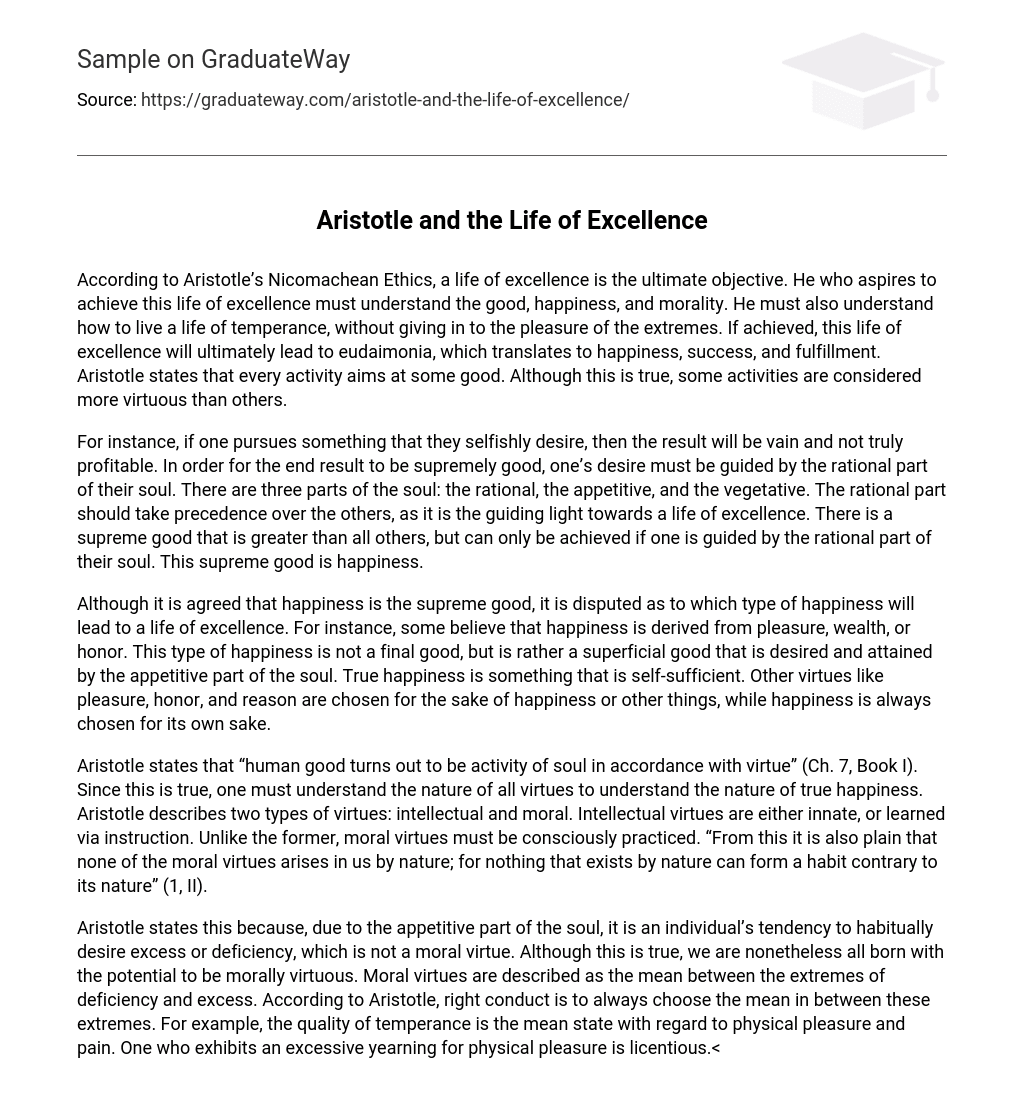Aristotle’s Nicomachean Ethics teaches that the ultimate goal is to live a life of excellence, which involves understanding good, happiness, and morality. It also includes finding balance and avoiding excessive pleasures. Achieving a life of excellence leads to eudaimonia or happiness, success, and fulfillment. Aristotle asserts that all activities aim for some kind of good, but certain activities are considered more virtuous than others.
To attain genuine profitability, one must allow their desires to be guided by the rational part of their soul. The soul consists of three parts: the rational, appetitive, and vegetative. Giving priority to the rational part is crucial as it leads to a life of excellence. Only when guided by this rational part can one achieve true happiness, which is the ultimate good.
While there is a general consensus that happiness is the ultimate good, there is no agreement on the particular type of happiness that leads to living a virtuous life. Some individuals contend that pleasure, wealth, or honor are the sources of happiness. However, this sort of happiness is not definitive; it merely fulfills our longing for satisfaction. On the other hand, genuine happiness endures and is pursued purely for its own sake, while other virtues such as pleasure, honor, and reason are pursued with the intention of attaining happiness or other objectives.
According to Aristotle, true happiness is found in the activity of the soul aligned with virtue (Ch. 7, Book I). To fully understand true happiness, one must grasp all virtues. Aristotle divides virtues into two groups: intellectual and moral. Intellectual virtues can be either innate or learned through instruction. In contrast, moral virtues necessitate conscious effort in order to cultivate them. “From this it is clear that none of the moral virtues are innate within us, as nothing in nature can develop a habit contrary to its own nature” (1, II).
Aristotle explains that because of the appetitive part of the soul, individuals have a natural inclination to crave excess or deficiency, which is not morally virtuous. However, despite this tendency, we all have the capacity to possess moral virtue. Moral virtues are defined as the balance between deficiency and excess. According to Aristotle, we should always choose the middle ground between these extremes as the right way to behave. For instance, temperance is the virtue that lies between experiencing too much or too little physical pleasure. Someone who excessively seeks physical pleasure is considered licentious.
He derives great pleasure and experiences intense pain when devoid of pleasure. The scarcity of this attribute lacks a commonly recognized term due to its rarity in human behavior, though some refer to it as insensibility. To lead a life of utmost quality, one must consistently engage in the deliberate practice of temperance, according to Aristotle. Furthermore, he asserts that this practice must be undertaken voluntarily. A voluntary act is one that is consciously performed, as opposed to an involuntary act executed in ignorance or under duress. If an action is carried out ignorantly or forcibly, it will not result in a life characterized by excellence.
Aristotle provides practical guidelines for decision-making. He advises that if the perfect option is not attainable, one should at least steer clear of the extreme opposite. It is crucial to identify our personal weaknesses and consciously steer away from them, a process facilitated by self-reflection. Furthermore, caution should always be exercised towards pleasure, as it hinders sound judgment. The pursuit of pleasure must be carefully regulated as it is a major obstacle in attaining a life of virtue.
Friendship is a crucial aspect in attaining a life of excellence, as stated by Aristotle. According to him, it is not only a virtue, but also essential for living (1, VIII). Friendship can be defined as a mutual feeling of goodwill between two individuals. Aristotle identifies three types of friendship: utility, pleasure, and goodness. Friendships of utility are self-seeking connections where individuals aim to gain benefits or fulfill their needs from each other. Friendships of pleasure occur when one is attracted to the other’s humor, attractiveness, or other pleasant attributes.
Superficial friendships do not lead to a life of excellence, but a friendship of goodness does. This type of friendship involves admiring each other’s goodness and helping the other improve. If achieved, it brings long-lasting and genuine happiness. The key to achieving a life of excellence and the highest form of happiness is contemplation, which is considered a divine activity. Contemplation engages the highest rational part of our soul, and only a god can spend their whole life in contemplation.
The pursuit of happiness is similar to contemplation as both involve an ongoing and self-sufficient process of seeking truth. Through contemplation, one can gain a deeper understanding of a life characterized by excellence. However, it is vital to acknowledge that this understanding alone does not ensure happiness. If it did, philosophy would be widely embraced. To achieve a life of excellence, one must not only comprehend but also consistently engage in the ethical virtues, contemplation, and moderation of pleasure. By making these practices habitual, an individual can attain a life characterized by excellence.





